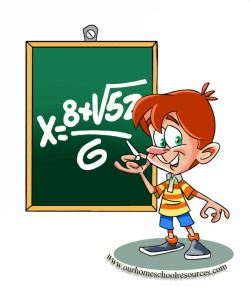Homeschool Math Curriculum for 2nd Grade
This page provides you with a sample homeschool math curriculum for 2nd grade kids. It is divided into weeks. You can adjust it according to your needs...
Week 1-2: Place Value
- Recognize numbers up to 1,000.
- Understand hundreds, tens, and ones.
- Read and write numbers using base-10 blocks, number names, and expanded form.
Week 3-4: Addition and Subtraction Within 100
- Strategies like regrouping (carrying/borrowing).
- Multiple-step word problems.
- Estimation in addition and subtraction.
Week 5-6: Time
- Telling time to the nearest five minutes.
- AM and PM concepts.
- Elapsed time within the hour.
Week 7-8: Money
- Recognize and count all US coins and the one-dollar bill.
- Making change.
- Simple money word problems.
Week 9-10: Geometry
- Identify and describe 2D shapes: triangles, quadrilaterals, pentagons, and hexagons.
- Identify and describe 3D shapes: cones, cylinders, spheres, and cubes.
Week 11-12: Measurement
- Measure objects using standard units (inches, feet, centimetres, meters).
- Compare lengths using >, <, =.
Week 13-14: Advanced Addition and Subtraction
- Add and subtract within 1,000.
- Understand the concept of regrouping in both addition and subtraction.
Week 15-16: Foundations of Multiplication
- Understand multiplication as repeated addition.
- Begin with arrays and grouping.
- Introduce the multiplication table (focusing on 0s, 1s, 2s).
Week 17-18: Data and Graphing
- Create and interpret line plots.
- Bar graphs and picture graphs.
- Answer questions based on data.
Week 19-20: Mental Math
- Strategies for quick addition and subtraction.
- Recognizing doubles, making tens, etc.
Week 21-22: Beginning Fractions
- Understand a fraction as part of a whole.
- Recognize and use 1/2, 1/3, 1/4.
- Equal shares in real-world contexts (like sharing a pizza).
Week 23-24: Geometry Continued
- Partition shapes into halves, thirds, and fourths.
- Recognize the fractions from the partitions.
Week 25-26: Advanced Time Concepts
- Calculate elapsed time to the nearest quarter-hour.
- Understand the concept of days, weeks, months, and years.
Week 27-28: Measurement Continued
- Measure the length of objects using two different units.
- Estimate lengths using units of inches, feet, centimeters, and meters.
Week 29-30: Arrays and Multiplication
- Continue building multiplication understanding with arrays.
- Introduce the concept of "times" as in "3 times 4."
Week 31-32: Advanced Money Concepts
- Solve some word problems that involve dollar bills, quarters, etc.
- Use the symbols $ and ¢ appropriately.
Week 33-34: Review and Deepen Concepts
- Revisit challenging topics.
- Deepen understanding of new problems and applications.
Week 35: Real-world Math Applications
- Apply math concepts in practical situations: planning a pretend party with a budget, measuring ingredients for a recipe, etc.
Week 36: End-of-Year Assessment and Celebration
- Informal assessment or review games to gauge understanding of the year's concepts.
- Celebrate progress with fun math activities, puzzles, or games.
Regular hands-on activities, math-based games, and consistent practice will be essential for consolidating understanding. As always, adjust the pace and content based on the student's individual needs.

What's in our homeschool...
Finding the right homeschooling curriculum that best fits my children's needs was one of the most significant challenges I had when we first started our journey. I found different curricula that best suit my children's needs...
As a parent, a homeschooled reading curriculum was at the top of my mind when we started homeschooling. English was one of the requirements in our state, and what better way to learn English than to read. Getting kids interested...
There are various homeschool math curricula that you can use in your homeschooling. As for me, I use Mathletics and Khan Academy for my children. They are beneficial for us. I use Mathletics for our homeschool math ...
A homeschool art curriculum has a lot of benefits to children. This includes the development of language and communication skills, dexterity, motor skills, creativity, focus, persistence, problem-solving skills, collaboration...
Our homeschool science curriculum includes a few different things. Science is really a wonderful thing to be studied and explored. When we introduce our children to various opportunities for science learning, they will experience...



